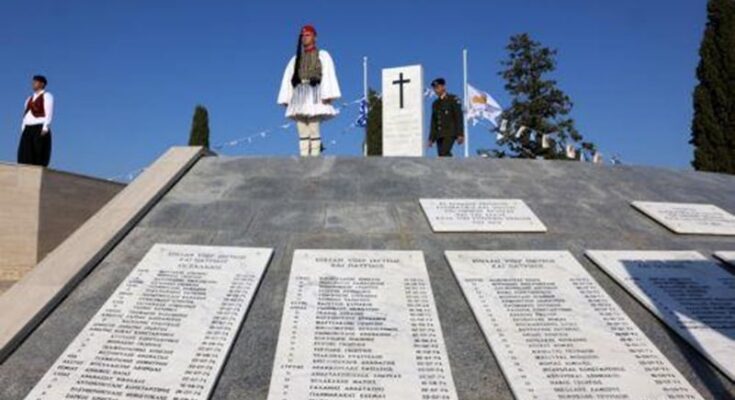On the anniversary of the Turkish invasion of Cyprus, sirens echoed across the island on Saturday. Greek Cypriots held somber memorials, while Turkish Cypriots commemorated the event with celebrations.
The sirens blared at 5:30 am, marking the time when the invasion began in 1974. A protest against the occupation took place across the buffer zone, sending a message against separation.
“This is a difficult day for everyone,” President Nikos Christodoulides said during a memorial service. “It has been 50 years, half a century since the Turkish invasion. Half a century of occupation, half a century under which we are living through the consequences of the barbaric Turkish invasion.”

Erdogan rules out Cyprus talks on Turkish invasion anniversary
In the north there was jubilation, where Erdogan observed a celebratory military parade in northern Nicosia. Turkey describes 1974 as a “peace and freedom operation”.
“The Cyprus Peace Operation saved Turkish Cypriots from cruelty and brought them to freedom,” Erdogan said, criticizing the south for having a “spoiled mentality” and seeing itself as the sole ruler of Cyprus.
He also dashed hopes for a resumption of talks on Cyprus. He reaffirmed his support for a two-state deal and ruled out peace talks based on a United Nations-endorsed plan for a federation.
“We believe a federal solution is not possible in Cyprus,” he said, adding that the Turkish north is the “apple of Turkey’s eye.”
“Hellenism will not stop fighting until Cyprus is reunited”
Christodoulides described it as a somber day of reflection and remembrance of the dead. No matter what Erdogan says or does, “Turkey continues to be responsible for violating human rights and international law.”
Greek Prime Minister Kyriakos Mitsotakis, speaking in Nicosia Saturday, said “that Hellenism will not stop fighting until Cyprus is reunited.”
In this half a century, the Republic of Cyprus shook off the effects of the invasion, modernized itself and its booming economy, becoming, with Greece’s assistance, a member of the European Union, all while keeping its demand of reunification alive, he noted.

“We believe that the Greek-Turkish detente helps the Cyprus issue move forward,” Mitsotakis said. “The fact that we talk (with Turkey) doesn’t mean we agree or, even more so, that we are retreating (from our positions). Greece, as a strong state in every respect, talks with everyone,” he added.
Mitsotakis noted that the resumption of talks on the basis of the recommendations by the UN Secretary-General’s envoy, Maria Angela Holguin, is the only way forward. Secretary-General Antonio Guterres shared that view in his latest meeting with the Greek Prime Minister.
“Only when someone is in the wrong, and is bereft of arguments, do they avoid dialogue. When they also resort to provocations, they make it worse, Mitsotakis said, alluding to the extravagant celebrations by Turkey in occupied Cyprus, for what they call the “great liberation” of the Turkish Cypriots.
Remarking that the capital Nicosia, divided by a wall separating the Greek-Cypriot and Turkish-Cypriot sectors remains Europe’s only divided capital, Mitsotakis said that this is a security matter for all Europe and all the West. He reminded his audience of officials of the recently support by European Commission President Ursula von der Leyen and European Parliament speaker Roberta Metsola for a united Cyprus.
“Without shedding our emotions, we in Athens and Nicosia must view the situation with pragmatism. Every solution demands brave decision…but we must not divide those who fight into better and lesser patriots,” Mitsotakis said, adding that both countries are coordinating their interventions in all international forums.



